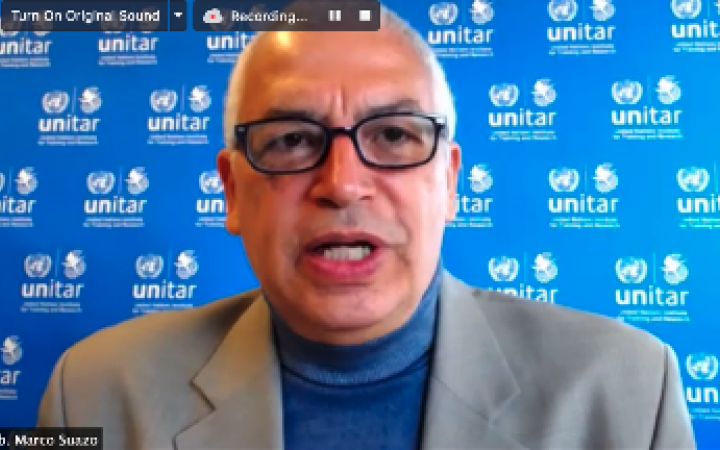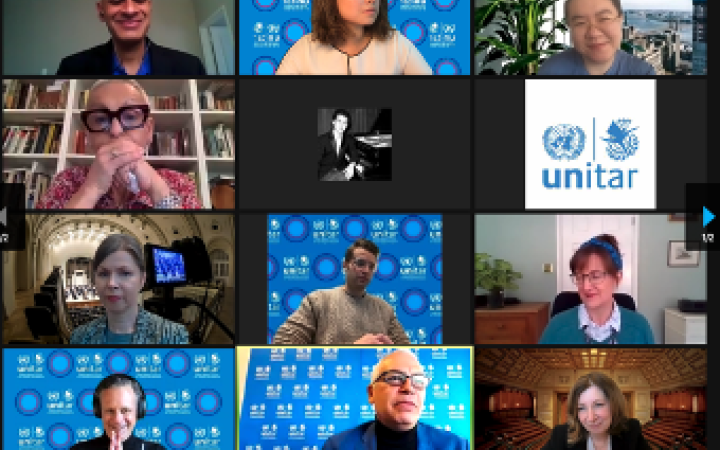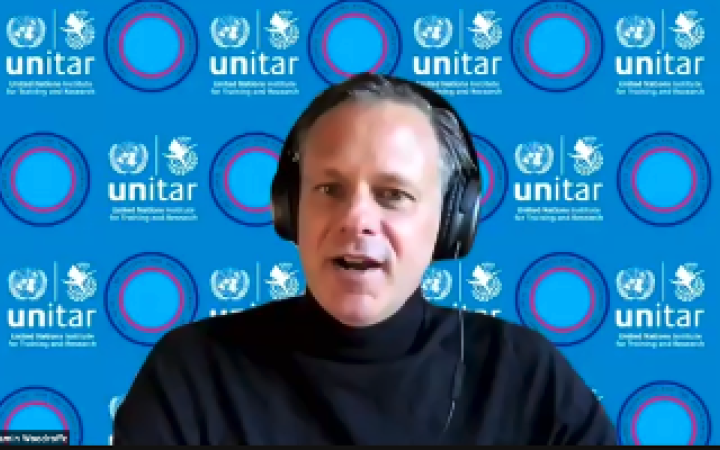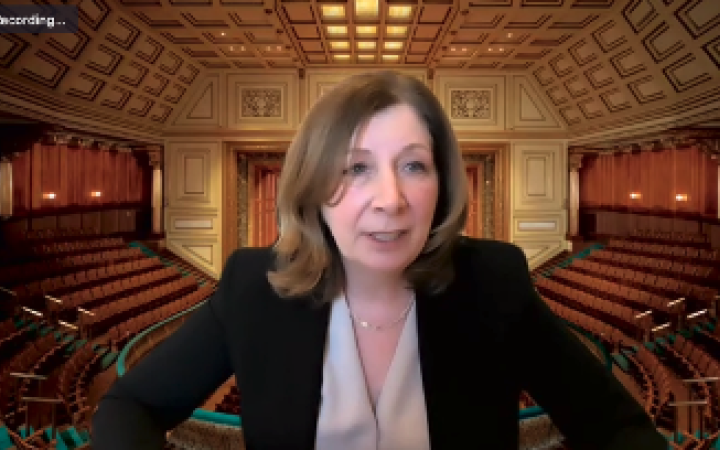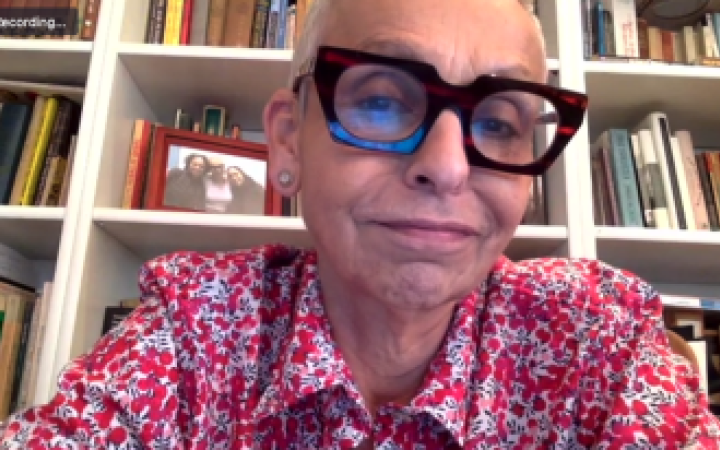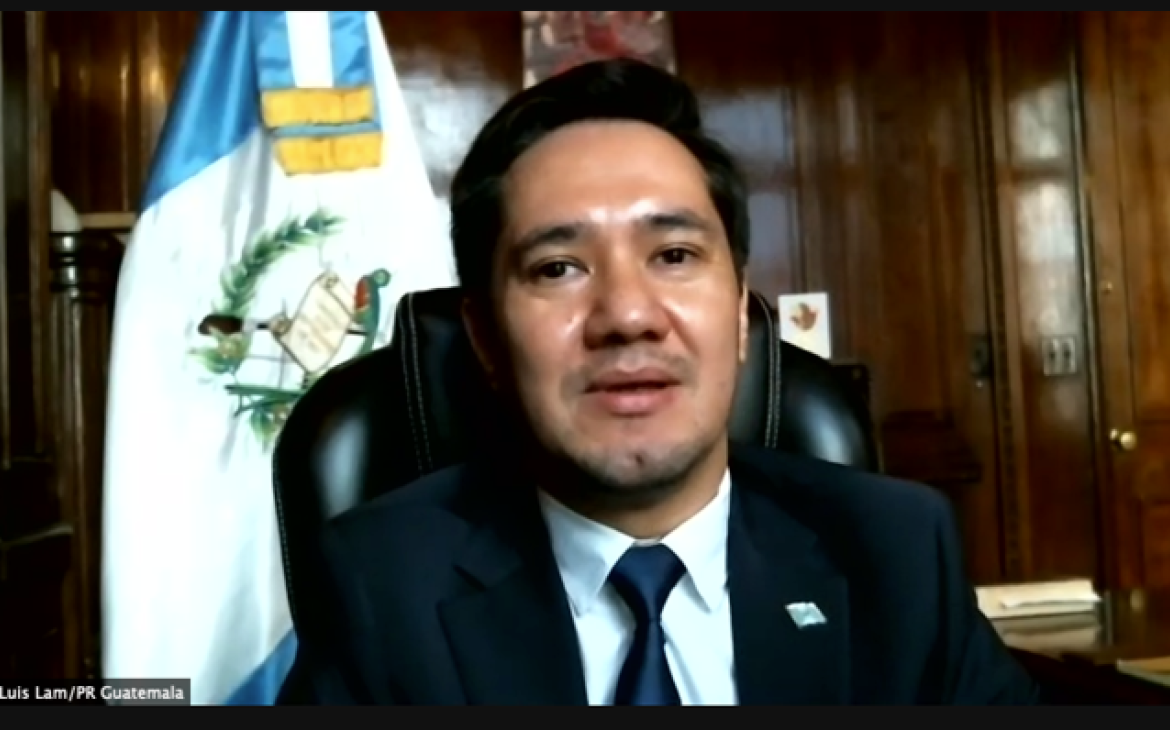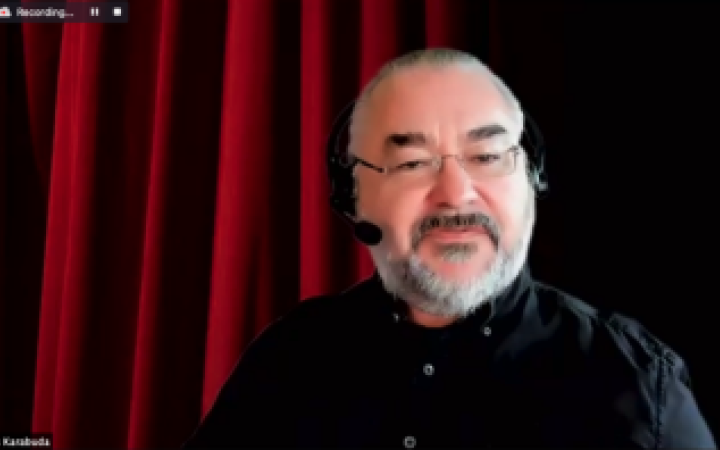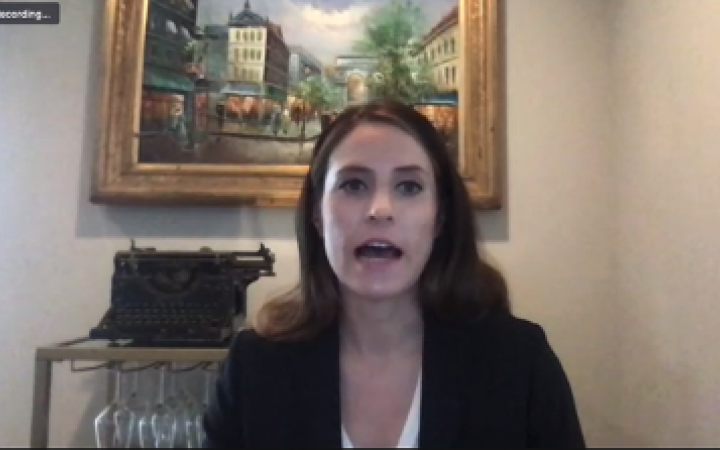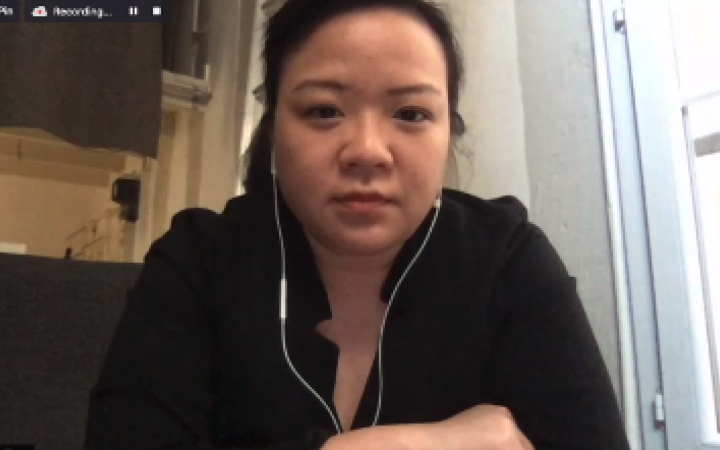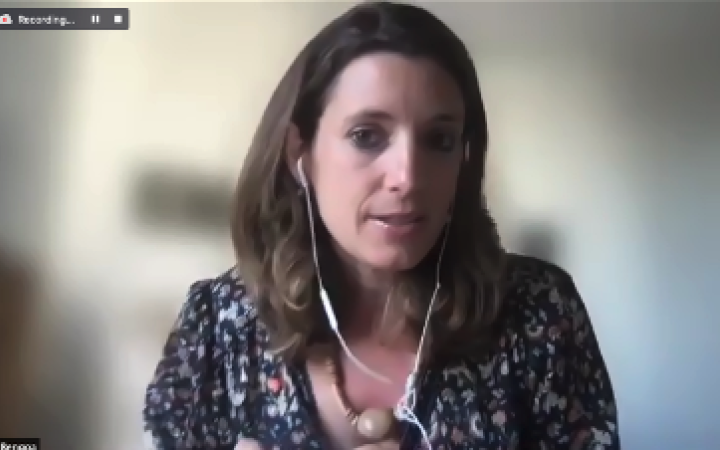29-30 March 2021, New York, USA (Virtual) – The United Nations Institute for Training and Research (UNITAR) New York office successfully held the “Leaving No One Behind: Validating ALL Voices of Culture” virtual webinar in partnership with the Global Foundation for the Performing Arts (GFPA). This two-day, two session webinar series not only featured a myriad of leaders and advocates in the art and cultural industries, but also marked the second time of successful collaboration between the UNITAR and the GFPA. Since last year, this fruitful partnership has directly benefitted over 190 participants from countries around the world.
The first day of the event started at 9:30 am (EST) with a heartfelt opening remark delivered by Mr. Benjamin Woodroffe, the President of the GFPA who is currently residing in Geneva, Switzerland. He mentioned that the entire art industry was going through a period of adjustment after the disturbance of COVID-19. Therefore, to ensure that the industry has the resources and the ability to “build back better”, the webinar aimed to put special attention on Education (SDG4), Gender Equality (SDG5), Economic growth and employment (SDG8), Sustainable Communities (SDG11) and Peace, Justice and Strong Institutions (SDG16). He then expressed his gratitude for audience and panelists’ participation, and thanked UNITAR New York office for its diligent effort and support in hosting the event. Afterwards, he passed the floor to H.E. Mr. Marco Suazo, the head of office of UNITAR New York office to deliver his opening remark for the series.
Mr. Suazo mentioned that although the work of the UN has never been severely disrupted as such until the hit of COVID-19 pandemic, the UN is still resilient and most importantly, UNITAR has been in the forefront of change. The productive partnership between the UNITAR and the GFPA is intrinsically important to the achievement of SDGs, especially during this special time. As we are rebuilding a society in which diversity should be a pre-requisite, it is our mutual goal to facilitate the conversations on including all individuals in the development agenda.
Mr. Woodroffe then passed the floor to the first speaker of the day, Ms. Lydia Connolly, the Director of the Head of Artist Management from Harrison Parrott. As a manger of talents, COVID-19 has brought a tremendous impact to the industry, and it has also increased the workload for people like her – instead of searching for opportunities for artists to present and express themselves, she is assisting artists in finding livelihoods and resources to support themselves and their families during this unprecedented time. Thankfully, the fast adaptation to technology presents a beacon of hope – however, the industry is now facing a series of new challenges such as copyrights and identifying the right audience group. Despite all these challenges, she is still positive that the pandemic might be a catalyst for change. Moreover, it is a great time to reshape the art and culture industry, and to include people and communities that are systematically left behind given their social and economic status prior to the pandemic.
The second speaker was Ms. Andrea Kayln, the President of the New England Conservatory. Speaking as an educator, she believes that now more than ever, in addition to nurturing the highest artistic standard, it is also critical to endow students with three new skills: creating connections with the real world and addressing real-life problems through arts; listening and thinking about the needs from audiences; treating music and art as a part of the birthright and feeling the obligation to bring it to more communities.
Continued with Ms. Kayln’s discussion, Ms. Hanna Aire-Gaifman, the director of Emerita, 92nd Street Y’s Tisch Center for the Arts mentioned that the pandemic has minored the gap between the established artists and the new artists – more online interactions are happening as the industry is shifting its physical presence online. The active engagement endowed more meanings to the artists’ work. Ms. Rūta Prusevičiené, the General Director of the National Philharmonic Society of Lithuania, Director of Vilnius Festival continued the conversation and shared her experience in organizing festivals during this special time. As she carefully followed the protocols of the pandemic, she also raised funding and navigated her way to a successful outdoor summer performing season in Lithuania. She encouraged institutions to budget more and attract more funding from program and donors, and most importantly, to never stop planning.
The last speaker for the first day was Mr. Karendra Devroop, Professor of Music and Director Unisa Music Foundation. Unlike music education and festival, competition faces more challenges as it requires more traveling, resources, and precision. Presenting from South Africa, pandemic destroyed the country’s not-so-developed art industry. Moving forward, Mr. Devroop rooted for a hybrid format for music events and especially, music competition, to continue its roles in the industry as an effective method in selecting the best talents and maintaining the industry’s standards.
The second day of the event started again at 9:30 am EST again with a brief conclusion on yesterday’s event from Mr. Woodroffe. As Mr. Woodroffe passed the floor to Mr. Suazo, he introduced the even’s keynote speaker, H.E. Mr. Luis Antonio Lam Padilla, the Permanent Representative of Guatemala to the United Nations.
Ambassador Padilla started the keynote speech by congratulating on the success achieved through the effective collaboration between the UNITAR and the GFPA, then he continued with his speech on how culture and arts in Guatemala consist of the driven force for SDGs. He referred to the Popol Vuh, a text recounting the mythology and history of K’iche’ people, one of the Maya peoples, who inhabit the Guatemalan Highlands. “Popol Vuh” translated as “Book of the Community” – a guiding sacred text whose value deeply resonated with the UN’s theme of leaving no one behind. Deeply ingrained in the Mayan’s tradition while also echoed the 2030 Agenda, Guatemala’s K’tun 2032 development plan is an example of combining local tradition with international agenda. Ambassador then introduced several cultural heritages in Guatemala including the celebration of Holy week and the religious festivity Paabanc. He emphasized that art is the equivalent of human development, and it is crucial to always include art and culture preservation as a country is in pursuit of SDGs.
After the keynote speech, Ms. Jennifer Dauterman, the founding director of Classical: NEXT took over the floor as the first speaker. Continued with the theme of the keynote speech, she agreed that art is a form of expression of how colorful humanity can be. Pandemic has broken the classical music out of its rusts and forced the industry to move forward and to be bolder. It is important for industry experts to accept the mind shift and develop new formats of presentation for arts.
However, the next speaker Mr. Alfon Karabuda, the President of International Music Council believed that the pandemic has severely marred the ecosystem of the classical music. As a third of the industry professionals in England decided to leave the field of music after pandemic, the classical musical industry is facing existential crisis, on top of its unwillingness in embracing diversity. He believed that the entire classical music industry needs to actively transform itself if artists want to continue creating value to the society.
Ms. Emma Sutton-Williams, the multihyphenate performer, writer, and social media guru echoed the viewpoints coined by Mr. Karabuda. She believes that the classical music is no longer relevant today – but it doesn’t mean that it is not an important field. She is highly passionate about education reform in classical music – she thinks that to move forward, music schools need to focus first on providing students with skills for survival, and then pursuing trainings in instruments.
The discussion then shifted its focus to gender equality when Ms. Rebecca Tong, the resident conductor of Jakarta Simfonia Orchestra shared her experience on training as a female conductor in a predominately male-occupied industry. She expressed her gratitude for her mentors and people around her who supported her pursuit in music, and said that she hasn’t put a special attention on gender – for her, similar to craftsmanship, conducting is a skill that doesn’t have a gender preference.
The last speaker of the entire event is Ms. Miren Bengoa, the former executive director of the Chanel Foundation. She encouraged people to look at today’s situation from a different angel. Coming from an international development background, she concluded two main challenges that artists are facing today: how to have a collective voice representing the artists community, and how immaterial resources such as culture and art can contribute to the society and most importantly, support the creators in a post-pandemic society. She encouraged artists not to shy away from topics related to business and presented several examples of how effective transition can result in success.
The entire session ended with a closing remark delivered by Mr. Suazo. He expressed his gratitude for all the artists who spent their time presenting in the event, and emphasized that as the dedicated training arm of the United Nations, UNITAR is in the forefront of advocating for diversity. The event was a great cross-industry success, and he is positive that UNITAR’s wide range of training and its relationship with the GFPA will benefit more individuals in the future.
Event Recording
The full recording of this two-day event can be found in the links below:


